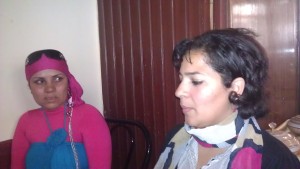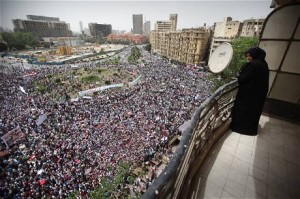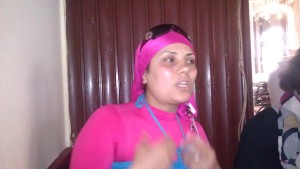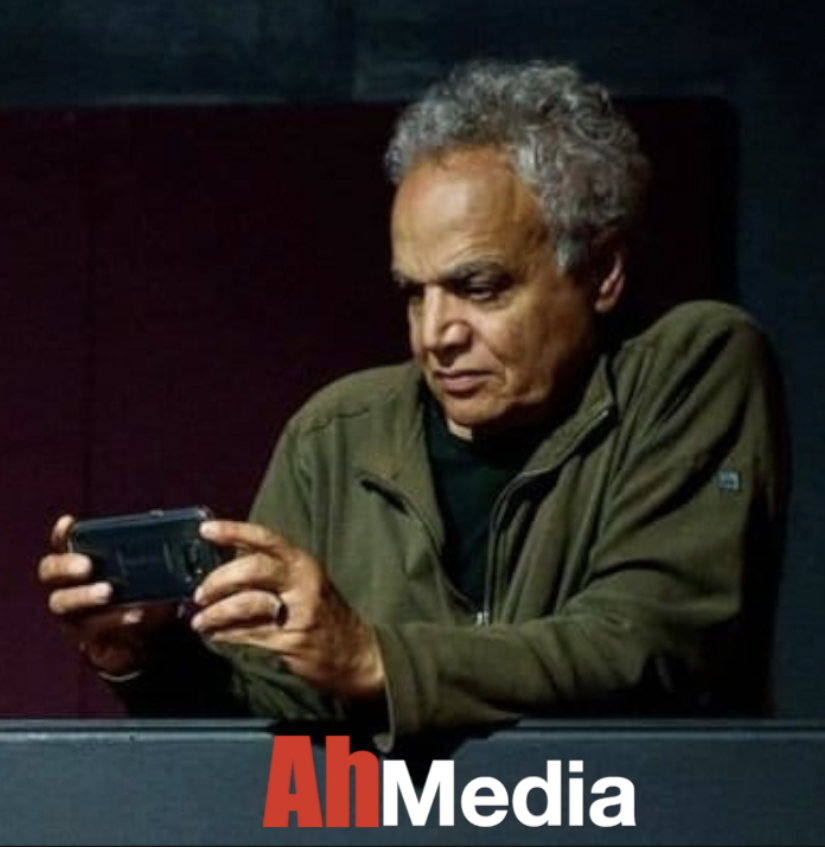
The Virginity War… Never bowed”
It matters not how strait the gate,
How charged with punishments the scroll,
I am the master of my fate: 15
I am the captain of my soul.
William Ernest Henley. 1849–1903
 A glorious 18 days of massive demonstration in Egypt, 18 million people went to street to demand their dignity and freedom, on February 11th, 2011 Egyptian Ex dictator Hosni Mubarak stepped down, marked the end of 30 years of absolute dictatorship,. The chant In Tahrir Square that night, changed from “The people want toppling of the regime” , to the “Military and the people one hand” … a month later, and on March 9th . 2011, the Egyptian Military who seized the power has its hand tainted forever, not just arresting, torturing, killing protesters in Tahrir Square… but and for the time in Egyptian Military history… forced women activists to go under virginity test.
A glorious 18 days of massive demonstration in Egypt, 18 million people went to street to demand their dignity and freedom, on February 11th, 2011 Egyptian Ex dictator Hosni Mubarak stepped down, marked the end of 30 years of absolute dictatorship,. The chant In Tahrir Square that night, changed from “The people want toppling of the regime” , to the “Military and the people one hand” … a month later, and on March 9th . 2011, the Egyptian Military who seized the power has its hand tainted forever, not just arresting, torturing, killing protesters in Tahrir Square… but and for the time in Egyptian Military history… forced women activists to go under virginity test.
 The virginity test allegations first surfaced after a March 9th rally in Cairo’s Tahrir Square that turned violent when men in plainclothes attacked protesters and the army intervened forcefully to clear the square. Amnesty International further documented the abuse allegations in a report that found 18 female detainees were threatened with prostitution charges and forced to undergo virginity tests. They were also beaten up and given electric shocks, the report said.
The virginity test allegations first surfaced after a March 9th rally in Cairo’s Tahrir Square that turned violent when men in plainclothes attacked protesters and the army intervened forcefully to clear the square. Amnesty International further documented the abuse allegations in a report that found 18 female detainees were threatened with prostitution charges and forced to undergo virginity tests. They were also beaten up and given electric shocks, the report said.
As was reported in the news, Major General al-Sisi said that ‘virginity tests’ had been carried out on female detainees in March to “protect” the army against possible allegations of rape, but that such forced tests would not be carried out again. He also added that the army would avoid detaining women in the future. This wasn’t the only perverse excuse we heard from the generals. The Amnesty International report continued, “The general, speaking on condition of anonymity, justified the abuse by saying that the women “were not like your daughter or mine. These were girls who had camped out in tents with male protesters.” Guilty of what, he didn’t elaborate. With the help of Karim Reda, a fBook activist friend in Egypt, I was able to get the phone numbers of two of these young women who had lived the “forced virginity test” ordeal. Rash Abdelrahman, a 28 year old college student and Jihan Mahmoud, a 29 year old social worker.
 I called Rasha Abdelrahman, introduced myself as Ahmed Tharwat, an Egyptian American, doing a TV story about the Egyptian revolution and the role of women. I continued, “I would love to talk to you about the …” (I wasn’t sure if I should say virginity test in Arabic in our first conversation) so I asked her, “Can I talk to you about the ordeal with the Military. She got my drift. “Ohhh, you mean … ‘Kashf Elozrayah’,” (virginity test) she causally said. “Sure, give me your number and I will call you back.”
I called Rasha Abdelrahman, introduced myself as Ahmed Tharwat, an Egyptian American, doing a TV story about the Egyptian revolution and the role of women. I continued, “I would love to talk to you about the …” (I wasn’t sure if I should say virginity test in Arabic in our first conversation) so I asked her, “Can I talk to you about the ordeal with the Military. She got my drift. “Ohhh, you mean … ‘Kashf Elozrayah’,” (virginity test) she causally said. “Sure, give me your number and I will call you back.”
 I was a little taken aback by her forthcoming attitude considering the cultural taboo and the ordeal. I was the one who held back, but, sure enough, two days late she called and asked if she could bring her friend, another young lady who was also a victim of the “Kashf Alozriay” ordeal. “Of course, I would love to talk to you both.” I chose a public place for our first meeting, the famous Groppi Café in downtown Cairo. I took my small FLIP camera and went to the café on a Tuesday afternoon. The time we set to meet was 2 pm, but knowing Egyptian time I freed up the whole afternoon for this meeting. Groppi is an old-fashioned café. Its glory days have passed by; nothing in the interior or exterior has changed since about the sixties, the spacious entrance, the breeze coming in the open doors, the tall windows, the smiling dark waiter, the broken tiles, the leaky faucet, ceiling fans, and, of course, the man with the tissue in the bathroom. Rasha called, “I’m in the subway now, another half an hour at most,” she explained. Of course, the Egyptians use the traffic as a pretext for anything out of their control although, ironically, the subway is the only thing in Egypt now that is working and is actually under control, but once you are in the subway, there is nothing you could do, but wait; it is your fate. An hour later she called again and asked if I could meet them outside the café. I stood up and headed outside. I had never seen them before, and they never seen me. They had never talked to the media or had a presence in YouTube universe. I expected to see broken women in traditional dress. Wandering outside, looked around and saw none of the kind of women I imagined. Finally, I spotted two young ladies talking, smiling and walking back and forth in front of the café. “Are you Rasha?” I asked them. “Are you Mr. Ahmed?” she giggled. “Yes, Ahlan Wasahlan. Welcome, and thank you for coming.” Rasha was wearing a stylishly modern hijab, the one that just covers the head, and not the face, and a red dress over her jeans. She had an infectious laugh, and did most of the talking. Jihan was the quite one; she had stylish short hair, a scarf around her neck, and magnetic deep dark eyes. Her dress was of a rebellious nature. “Anything to drink?” the waiter asked. Everyone ordered lemonade. “There is no lemonade.” the waiter said. .. … why? “The blender is broken.” The dark skinny waiter said with a shy smile. . The Groppi cafe has been known for its excellent fresh lemonade since the sixties, It is a very comfortable homey place, where a waiter can give you excuses like this. We ordered drinks that don’t require blender work, which is tea. Jihan never touched her drink; she was very quiet, and she didn’t say a word for more than 30 minutes. Rasha took control of the conversation.
I was a little taken aback by her forthcoming attitude considering the cultural taboo and the ordeal. I was the one who held back, but, sure enough, two days late she called and asked if she could bring her friend, another young lady who was also a victim of the “Kashf Alozriay” ordeal. “Of course, I would love to talk to you both.” I chose a public place for our first meeting, the famous Groppi Café in downtown Cairo. I took my small FLIP camera and went to the café on a Tuesday afternoon. The time we set to meet was 2 pm, but knowing Egyptian time I freed up the whole afternoon for this meeting. Groppi is an old-fashioned café. Its glory days have passed by; nothing in the interior or exterior has changed since about the sixties, the spacious entrance, the breeze coming in the open doors, the tall windows, the smiling dark waiter, the broken tiles, the leaky faucet, ceiling fans, and, of course, the man with the tissue in the bathroom. Rasha called, “I’m in the subway now, another half an hour at most,” she explained. Of course, the Egyptians use the traffic as a pretext for anything out of their control although, ironically, the subway is the only thing in Egypt now that is working and is actually under control, but once you are in the subway, there is nothing you could do, but wait; it is your fate. An hour later she called again and asked if I could meet them outside the café. I stood up and headed outside. I had never seen them before, and they never seen me. They had never talked to the media or had a presence in YouTube universe. I expected to see broken women in traditional dress. Wandering outside, looked around and saw none of the kind of women I imagined. Finally, I spotted two young ladies talking, smiling and walking back and forth in front of the café. “Are you Rasha?” I asked them. “Are you Mr. Ahmed?” she giggled. “Yes, Ahlan Wasahlan. Welcome, and thank you for coming.” Rasha was wearing a stylishly modern hijab, the one that just covers the head, and not the face, and a red dress over her jeans. She had an infectious laugh, and did most of the talking. Jihan was the quite one; she had stylish short hair, a scarf around her neck, and magnetic deep dark eyes. Her dress was of a rebellious nature. “Anything to drink?” the waiter asked. Everyone ordered lemonade. “There is no lemonade.” the waiter said. .. … why? “The blender is broken.” The dark skinny waiter said with a shy smile. . The Groppi cafe has been known for its excellent fresh lemonade since the sixties, It is a very comfortable homey place, where a waiter can give you excuses like this. We ordered drinks that don’t require blender work, which is tea. Jihan never touched her drink; she was very quiet, and she didn’t say a word for more than 30 minutes. Rasha took control of the conversation.
 I first asked them to tell me what actually happened that day of March 9th 2011. “The military wanted to break us, and humiliate us,” Rasha explained, “and as far as I’m concerned, Tantawi is a war criminal,” she said with a strong voice. “We were there at Tahrir for the general strike; we thought it would be like all other demonstration,” Rasha added. “We went to Tahrir, as usual,” Jihan explained, “the day was uneventful. Later at about 4pm, , we found people in plainclothes, started attacking us with rocks, and Molotov cocktails. I had to get a stick to protect myself,” Jihan explained.
I first asked them to tell me what actually happened that day of March 9th 2011. “The military wanted to break us, and humiliate us,” Rasha explained, “and as far as I’m concerned, Tantawi is a war criminal,” she said with a strong voice. “We were there at Tahrir for the general strike; we thought it would be like all other demonstration,” Rasha added. “We went to Tahrir, as usual,” Jihan explained, “the day was uneventful. Later at about 4pm, , we found people in plainclothes, started attacking us with rocks, and Molotov cocktails. I had to get a stick to protect myself,” Jihan explained.
Rasha and Jihan talked to me in more detail about the most tragic day of their life, about their abducted friends, who were being taken away to the Egyptian Museum and not returning. They went to find out what was happening. They were surprised to find themselves arrested, beaten, and verbally abused by military security. “You are whores, decent girls stay home and don’t come to Tahrir,” the officer told them.
 “The beating started,” Jihan said. “I told the officer who I had seen before in another confrontation, no matter what you do to me, nothing will break me tonight.” This was a challenge to him and he wanted to break us. “You are my game tonight,” he told Jihan. They tied them to the Egyptian Museum fence like animals, beating them, and verbally abusing them. Four hours later, they took them away to the military jail in El Hexisteb, a military base in Cairo. “Once I saw a big picture of Mubarak hanging on the wall of the office, I told myself, this can’t be good,” Rasha remembered. “Then the general came and asked if we had any health problems. Next, a female jailer,” Rasha continued. (A social worker according to Jihan, who is a social worker herself with a degree in psychology.) They took them to room which was missing its door. The female security guard started frisking them, touching them all over. They complained about the overzealous security female guard. “This is wrong, sir,” Rasha told the male officer. “Either this female guard or we get a male one” he threatened them. “It was very humiliating,” Rasha said. The female security asked them to undress, they thought just jackets and scarves . No, everything, take all your cloth, off, even your underpants” the security ordered them with a firm voice.. “I could see the solders and officers standing outside watching what is going on inside the room” Jihan said. “All this was done by our military, the one who claimed they protected the revolution,” she said incredulously. “If it was the security police (known for their brutality and abuse), I would understand it,” Jihan interrupted, “but this our military.” “I just got rid of an old corrupt regime, to get this?” Jihan wondered aloud. “It is late into the night now. They were tired and frustrated, however, holding strong, their morale still high. “They really didn’t think we would be that strong,” Jihan explained. A military physician, Ahmed Adel walked into the room, and without saying a word, have their hymens checked. Later and on March 11, Dr. Adel was declared innocent by a military court.
“The beating started,” Jihan said. “I told the officer who I had seen before in another confrontation, no matter what you do to me, nothing will break me tonight.” This was a challenge to him and he wanted to break us. “You are my game tonight,” he told Jihan. They tied them to the Egyptian Museum fence like animals, beating them, and verbally abusing them. Four hours later, they took them away to the military jail in El Hexisteb, a military base in Cairo. “Once I saw a big picture of Mubarak hanging on the wall of the office, I told myself, this can’t be good,” Rasha remembered. “Then the general came and asked if we had any health problems. Next, a female jailer,” Rasha continued. (A social worker according to Jihan, who is a social worker herself with a degree in psychology.) They took them to room which was missing its door. The female security guard started frisking them, touching them all over. They complained about the overzealous security female guard. “This is wrong, sir,” Rasha told the male officer. “Either this female guard or we get a male one” he threatened them. “It was very humiliating,” Rasha said. The female security asked them to undress, they thought just jackets and scarves . No, everything, take all your cloth, off, even your underpants” the security ordered them with a firm voice.. “I could see the solders and officers standing outside watching what is going on inside the room” Jihan said. “All this was done by our military, the one who claimed they protected the revolution,” she said incredulously. “If it was the security police (known for their brutality and abuse), I would understand it,” Jihan interrupted, “but this our military.” “I just got rid of an old corrupt regime, to get this?” Jihan wondered aloud. “It is late into the night now. They were tired and frustrated, however, holding strong, their morale still high. “They really didn’t think we would be that strong,” Jihan explained. A military physician, Ahmed Adel walked into the room, and without saying a word, have their hymens checked. Later and on March 11, Dr. Adel was declared innocent by a military court.
They, in all, 18 women, suffering together through a long night of beatings and humiliation. Then the Military Security took them to the military administrative center where they put Molotov’s bottles on table on front of them, started taking pictures of them without any permission. “You are taking picture of us, so you can distort our images in your media,’ Jihan told the officer. “This officer did something I will never forget,” Jihan said in a defiant voice. He kicked me so hard. It was personal, between me and him, not a security issue,” Jihan explained. Jihan and Rasha believed that the forced virginity test was all planned; it wasn’t just an oversight or mismanagement by a few angry individuals. “They have higher orders,” Rasha said. In a such patriarchal society the Military wanted to discredit the young activists and the young revolutionaries movement all together as decadent young troublemakers. . Then Jihan looked at herself and said, “My clothes have to stay on my body until I get my day in court, but in the jail, I was forced to take my clothes off, and forced to have my virginity checked.” … it is raped, I was rapped that day” she added. The officers kept humiliating them, telling them angrily it is their entire fault, repeating, “Decent women don’t do this, they stay home, they don’t protest or go to Tahrir.” Rasha explained,
“This officer doesn’t read or understand history, Egyptian women played a major role in revolution, starting a long time ago, in the 1919 revolution, and Hoda Sharawi with her women rights movement that started in Egypt in the 30s.”
I asked them if we could meet again at Tahrir Square, ,, there was another Molyonia (one million man march) coming next Friday April 20th, “save the revolution day”. We met there at the famous Kentucky restaurant in Tahrir Sqaure, at about 1030pm, they were charged and energized, everyone was, this was the day where all the political factions came for one thing; to reject the Military mishandling of the country affairs. Rasha and Jihan walked through Square, visited the same places where they were taken away, beaten and abused, this is the first time they come back and talk about it. “This is the tree that I was hiding under when they attacked us” Rasha said. “I have a vey a great affinity to this tree, it saved my life”. She said as she stood under the tree in a playful way. We walked to the Egyptian Museum, passing all the Salfay tents and banners spreading allover Tahrir. , ‘Rasha was very talkative that nigh, meeting and greeting everyone there. Then she suddenly stopped by the Egyptian Museum fence, “Here is where we were dragged and tied to that fence”. as she reenacted the way she was tied to the fence, standing spreading her arms, her back against the fence as if she was crucified. Jihan who was a little quite, pointed at a spot inside the Museum and said “there, where the officer screamed at me and said, “on your mom soul, you are my toy tonight”
I finally asked both of them how this virginity test ordeal had affected their lives.
“March 9th, 2011, ”
this day was a great honor, and to me it was the first day of the Egyptian revolution,” Rasha said in a very deep, serious voice.
Jihan looked at me with her deep dark eyes, smiled and said nothing; until today her look still haunts me. This was their story, the story where two amazing young Egyptian women, exposed the Egyptian Military, the Egyptian military that lost its virginity on March 9th, 2011.
Ahmed Tharwat, Host of Arab American TV Belahdan TV
Freelance writer
ahmediatv@gmail.com
www.ahmediatv.com
